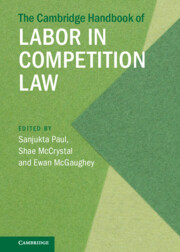Book contents
- The Cambridge Handbook of Labor in Competition Law
- The Cambridge Handbook of Labor in Competition Law
- Copyright page
- Contents
- Contributors
- Preface
- 1 Labor in Competition Law
- 2 Collective Labour Rights for Working People
- 3 Economic Coordination as Freedom of Association
- 4 The State’s Power to Govern in This Field Is Paramount: Antitrust, Labor, and the First Amendment
- 5 Competition Law as Collective Bargaining Law
- 6 Antitrust, Free Trade, and Fissuring
- 7 American Antitrust Exceptionalism
- 8 Competition and Labour Law in Canada
- 9 Workers and Competition Law in Japan
- 10 Workers and Competition Law in Australia
- 11 Workers and Competition Law in New Zealand
- 12 Competition Law and Labour Law
- 13 Workers and Competition Law in India
- 14 Competition and Labour Law in the United Kingdom
- 15 A Solution in Search of a Problem?
- 16 Competition and Labour Law in Germany
- 17 Labour Law and Competition Law Under French Regulation
- 18 Competition Law, Cartels and Collective Bargaining
- 19 The EU, Competition Law and Workers Rights
- 20 Is South American Collective Labor Law Confronted by Competition Law?
- 21 Conclusion
2 - Collective Labour Rights for Working People
The Legal Framework Established by the International Labour Organization
Published online by Cambridge University Press: 05 May 2022
- The Cambridge Handbook of Labor in Competition Law
- The Cambridge Handbook of Labor in Competition Law
- Copyright page
- Contents
- Contributors
- Preface
- 1 Labor in Competition Law
- 2 Collective Labour Rights for Working People
- 3 Economic Coordination as Freedom of Association
- 4 The State’s Power to Govern in This Field Is Paramount: Antitrust, Labor, and the First Amendment
- 5 Competition Law as Collective Bargaining Law
- 6 Antitrust, Free Trade, and Fissuring
- 7 American Antitrust Exceptionalism
- 8 Competition and Labour Law in Canada
- 9 Workers and Competition Law in Japan
- 10 Workers and Competition Law in Australia
- 11 Workers and Competition Law in New Zealand
- 12 Competition Law and Labour Law
- 13 Workers and Competition Law in India
- 14 Competition and Labour Law in the United Kingdom
- 15 A Solution in Search of a Problem?
- 16 Competition and Labour Law in Germany
- 17 Labour Law and Competition Law Under French Regulation
- 18 Competition Law, Cartels and Collective Bargaining
- 19 The EU, Competition Law and Workers Rights
- 20 Is South American Collective Labor Law Confronted by Competition Law?
- 21 Conclusion
Summary
This chapter analyses the evolution of International Labour Organization (ILO) standards governing who is entitled to claim collective labour rights. It argues that the personal scope of such rights extends beyond ‘the standard employment relationship’, with implications for the scope of competition law. The first part analyses treatment of freedom of association and collective bargaining in constitutional and other declaratory ILO instruments, identifying the broad protectorate of these entitlements, reflecting the desire to promote equality and resist commodification of labour. These constitutional norms have been further reinforced by proposals for a universal labour guarantee and acknowledgement of the role of collective voice in promoting sustainability. The second part examines fundamental ILO Conventions Nos 87 and 98 on the right to organise and collective bargaining, Recommendation No. 198 on the employment relationship and the findings of ILO supervisory bodies which apply these standards in a manner consistent with established constitutional norms. While supervisory bodies encourage states to consult with social partners to modify existing collective bargaining systems to reflect the needs of ‘self-employed workers’, this should be understood less as a concession to managerial prerogative, but more as promotion of reform protecting the vulnerable in a changing world of work.
Keywords
- Type
- Chapter
- Information
- The Cambridge Handbook of Labor in Competition Law , pp. 11 - 26Publisher: Cambridge University PressPrint publication year: 2022
- 2
- Cited by

